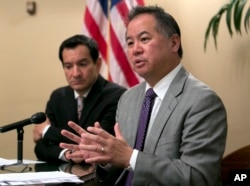Last month, San Diego police knocked on Brandon Snyder's door and took away his rifle. They did it using a new tool: an emergency protective order issued by a court, just like orders that for years have been used to prevent spousal abuse or stalking.
California is one of only two states that allow family members to seek a gun restraining order when they see warning signs that a gun owner might pose a danger to himself or others. Five other states allow only police officers to seek gun protective orders. Nearly 20 others are considering such measures.
In the wake of last month's mass shooting at a Florida high school, many on both sides of the gun debate — from firearms control advocates to gun lobbyists — see so-called "red flag" laws like California's as a politically viable solution to gun violence. And they're pushing more states to adopt them.
Co-workers of Snyder, 31, a mechanic at a car dealership, became alarmed after he praised Las Vegas mass shooter Stephen Paddock for not "committing suicide until he'd gunned down enough people to set a modern record," said Mara Elliott, San Diego's top prosecutor.
That wasn't all.
"What he told his co-workers is, if it was up to him, he'd have shot up a mosque and then shot it out with the cops," recalled Elliott, whose office investigated the case.
Snyder, facing the prospect of dismissal, told his Ford dealership colleagues that if he was let go, he'd return with a gun. A co-worker called police.
Semiautomatic rifle surrendered
Unable to charge Snyder with a crime, prosecutors obtained an emergency firearms protective order. On February 27, he surrendered his semiautomatic rifle and "significant killing capability," Elliott said.
"We take no chances," she told VOA.
Snyder could not be immediately reached for comment. Tom Nicholl, the general manager of the dealership where Snyder worked, did not respond to requests for comment.
In the United States, where many citizens take their constitutional right to own firearms as seriously as the right to free speech, removing a gun from a lawful owner is no easy task. But San Diego has done it 19 times in the past three months under California's three-year-old law.
And Elliott said it's working.
The law "gives people the opportunity to speak up and get a response before waiting for a crime or tragedy to happen," the prosecutor said.
Last week, Florida passed a gun law that allows police officers, though not family members, to obtain gun restraining orders.
The state's two senators, one a Republican and one a Democrat, recently introduced a bill in Congress that incentivizes states to adopt gun restraining order laws. The White House has spoken out for the measure.
In an about-face, the National Rifle Association (NRA), the nation's main gun lobby, has thrown its support behind it.
"We need to stop dangerous people before they act, so Congress should provide funding for states to adopt risk protection orders," Chris Cox, the NRA's chief lobbyist, said in a video message last week.
Does it work?
However, hard evidence that gun restraining orders are effective remains thin. In recent years, there has been only one major study on the topic, and it focused on the law's effectiveness in preventing suicide in Connecticut.
The 2016 study, widely cited by gun control advocates, showed that for every 10 to 20 gun restraining orders issued in the state from 1999 to 2013, a life was saved.
Though the NRA has come on board, other gun rights advocates say treatment, not gun seizure, is the answer to dealing with gun owners who show signs of trouble.
"If you really believe somebody is a danger to themselves or others, then you ought to think about involuntarily committing them to some type of mental health facility," said John Lott, an economist and founder of the right-leaning Crime Prevention Research Center.
Others worry that gun protection order laws may infringe on free speech, due process and other constitutional rights.
"I don't want a police officer simply judging somebody's talk to be sufficient to seize their arms," said Peter Langrock, a Vermont lawyer who says he's not a supporter of the NRA.
Right balance
But supporters of gun restraining orders say the law strikes the right balance between public safety and civil liberties.
"The due process goes into balancing public safety," said John Hemmerling, a prosecutor in the San Diego city attorney's office."The due process plays itself out within 21 days."
On March 20 — 21 days after giving up his rifle — Snyder will have his day in court, where a judge will hear his side of the story and decide whether to allow Snyder to retrieve his gun or extend the restraining order for up to a year.
Researcher Lynn Davis contributed to this report.






